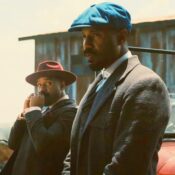So, you want to write a Broadway musical?
Eric Idle is here to tell you it’s not all spam and roses.
Idle wrote the book and lyrics (and co-wrote the music) of Spamalot, the phenomenally successful musical that won three Tony Awards, including Best Musical, along with a Grammy. On paper, its success seemed preordained. It was based on the classic 1975 comedy Monty Python and the Holy Grail. As producer Bill Haber told Idle, “This stuff has been getting laughs for 30 years.” Oscar and Tony Award-winning director Mike Nichols, a friend of Idle’s for 15 years, also eagerly signed on. The cast comprised brilliantly funny actors, including Tim Curry, Hank Azaria, and David Hyde Pierce, and one fabulous discovery, Sara Ramirez.
What could go wrong?

As Idle chronicles in his new book, The Spamalot Diaries, there were creative decisions that tested friendships, cast members who did not rise to the occasion, and personal travails that provided a reality check. It’s a privileged peek behind the curtain at the creative process.
Funny story: Idle forgot he wrote the diary. He found it while he and his wife were packing to move to smaller environs (“Downsize Abbey,” he joked). In a phone interview, Idle reflected on Spamalot’s sometimes fraught, ultimately triumphant journey to Broadway in advance of the 20th anniversary of the musical’s pre-Broadway Chicago run.
Donald Liebenson: You write that you forgot you had written the diary. What was your reaction when you found it?
Eric Idle: It was mind blowing. I started to read it and gave it to my wife. She said it was fascinating and wanted to get back to it because she wanted to know what happens. I said, “You know what happens.” (laughs) I do like the diary form. I’d done it with The Greedy Bastards Tour. I decided to keep in all the warts and the rows. That’s what’s great about a diary. It’s not something you’re writing for publication; it’s what you think privately. You can always cut it later.
DL: The diary picks up shortly after the project is a go. But I’m curious how you pitched the other members of Monty Python.
EI: I didn’t pitch it to the Pythons as such. [Composer] John Du Prez and I were looking for a subject for a musical. It suddenly occurred to me that Holy Grail was perfect. I wrote a treatment, and we wrote about four or five songs, including “Whatever Happened to My Part.” We sent all that to the Pythons individually. That was the pitch. And they all loved “Whatever Happened to My Part.” It is very Python in a way because it turns and looks at itself. And they said yes from that.
DL: Was the success of Mel Brooks’ The Producers (which opened in 2001) an inspiration?
EI: We had already started writing Spamalot. I happened to be in New York, and a friend said he had an invite to a Broadway opening, The Producers. I said, “Are you kidding? Of course we’re going.” I remember thinking, now they will take Spamalot seriously. Because there had been no musical comedy. The musical comedy form is the most agreeable form of theater. You laugh, you get a song and a little romance. It’s just very fine theater.
DL: I’m in Chicago and so glad you chose the city for its pre-Broadway run. I got to see it and it was one of the best nights I’ve had in a theater.
EI: One of the happiest times of my life was going to Chicago with the company. The producers wanted to go to Boston. I said, “The best audiences are in Chicago.” There are people who don’t wear shirts in the winter and they don’t give a f–k about New York. It was just a great time going there. We had three blizzards. You make it in Chicago, New York will be easy.
DL: From reading the diary, I get the impression that you prefer writing for the stage as opposed to films because you can continue to tinker, try new things, even replace cast members.
EI: In theater, they respect the writer. They always replace writers in Hollywood. They don’t know what they want, and they don’t know how to get it. It’s a horrible job. The theater is much more fun. But even with our great choreographer Casey Nicholaw and director Mike Nichols, who was also one of the great comedians, we were still solving quite complex problems. There were a lot in Act II. I was reassured to read in a book about Rodgers and Hammerstein that quite often they didn’t know what would happen in Act II; they would leave it to the rehearsal stage to work it out. Mike said to me the three most important things about the musical are the play, the play, the play.
DL: One of those complex problems, according to the diary, was what to do with the Cow number (a French-style torch song an unfortunate bovine sings before being catapulted off the castle). I loved that number.
EI: I instinctively thought Mike was right the minute he suggested cutting the number, and I’ll tell you why. What happened was, the English knights are all being taunted by the French and then the castle set revolves and out comes this Christian Dior-dressed cow. She sings this beautiful waltz about this being her final moo; the castle revolves again and the cow comes over the wall and lands on Patsy. Not a laugh in the house. Because we now know who the cow is and we are invested in the cow. It killed the laugh stone dead. Which meant the scene wasn’t funny, which meant we went into intermission without a big laugh. Once we took that song out, it was just a cow comes over and lands on him. Big laugh. It was a fine number, a lovely number, but it went into a different level, deeper than the comedy.
DL: One of the show’s most explosive laughs comes in the song “You Won’t Succeed on Broadway,” which includes the line, “You won’t succeed on Broadway if you don’t have any Jews.” You write that Mike Nichols was worried about that line.
EI: It came from something [Saturday Night Live creator] Lorne Michaels once told me: that Jews are the leaven that makes the bread rise. It’s such a lovely metaphor. Mike was the only one worried about it. On the very first night, he said, “We’ll try it and if it doesn’t go, we’ll cut it.” David Hyde Pierce says the line and there was this explosion of laughter. Mike said to me, “That’s all right then.”
DL: I confess I don’t always read the Acknowledgements, but I didn’t want the book to end and was hoping for a few more silly bits. But there you mention your pancreatic cancer diagnosis. How are you?
EI: Thank you for asking. I’m a five-year survivor. I feel like I got a reprieve. This is all extra time, and life is to be enjoyed and not wasted in arguments. I’m doing a one-man musical. I’m going to Sydney on Sunday to start the whole process. I like creating and performing. It’s fun to make people laugh. It’s healthy in an odd way.
Become a Saturday Evening Post member and enjoy unlimited access. Subscribe now




Comments
Thanks for this feature, Don. I certainly hope Eric’s new venture is successful, but most importantly he retain good health for years to come.
The Spamalot piece reminds me how much I miss the Monty Python cast and their laugh-provoking lines .
Why aren’t Monty reruns on TV now?